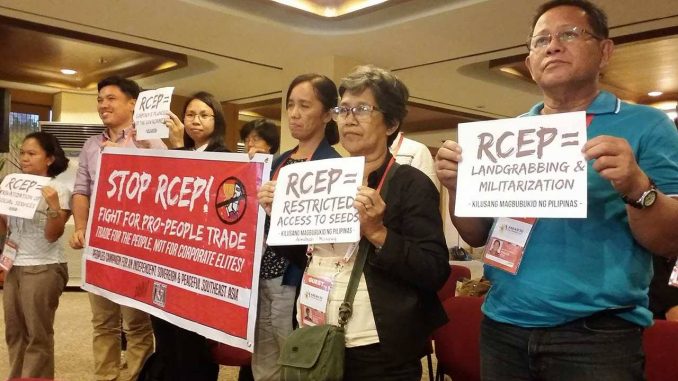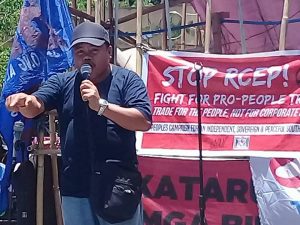
#NoRCEP week of actions hound 18th TNC Meeting of the Regional Comprehensive Economic Partnership
Amid growing opposition against the Regional Comprehensive Economic Partnership (RCEP), civil society groups in the Philippines and across Asia Pacific held actions and demonstrations to protest the regional trade deal currently under negotiation between 16 participating countries. From May 2-12, RCEP trade negotiators gathered at the Philippine International Convention Center (PICC) in Manila for the 18th round of negotiations as CSOs conducted parallel activities dubbed as a #NoRCEP week of action.
On May 10 during the stakeholder engagement meeting in front of RCEP negotiators, members of the People Over Profit network staged a protest action inside the PICC halls. Immediately after civil society representatives delivered their interventions, groups representing workers, peasants, fisherfolk, health groups, science and environmental advocates stood up and held banners demanding a stop to the negotiations while warning of RCEP’s impending threats to people’s rights across the region.
“We do not need RCEP. We need a genuine agrarian reform that will break up land monopolies and give ample government support services,” said Zenaida Soriano, Vice-Chairperson of the Asian Peasant Coalition (APC) and from the AMIHAN Peasant Women as she reminded government representatives of the plight of Filipino farmers and farmworkers that remain landless until today.
Lower wages, restricted access to seeds
A day after the dialogue, civil society groups led by the Bagong Alyansang Makabayan (BAYAN) and People Over Profit marched to Mendiola in front of the presidential palace to oppose the Philippine government’s hosting of the RCEP round of negotiations and expose its threats to key sectors of the country.
“For us workers, RCEP will only worsen the contractualization of labor and would mean a race to the bottom for workers wages and labor standards,” said Roger Saluta from the Kilusang Mayo Uno (May First Movement) during a protest rally in front of the Philippine presidential palace last May 11.
“RCEP will only encourage the current practice of big foreign companies to invest in the Philippines to make the most out of low wage rates,” Saluta added. Worsened working conditions, should the RCEP be implemented, will also force more Filipinos to migrate in other countries for work opportunities, but also at low wage rates, Arman Hernando from Migrante International explained.

On agriculture, Antonio Flores from the Kilusang Magbubukid ng Pilipinas (Peasant Movement of the Philippines) said, “RCEP won’t address our need for genuine agrarian reform and rural development. It will also be a threat to traditional farming practices as it proposes to ban our practice of freely saving and storing seeds.”
Threat to privacy, restricted access to medicines
“Leaks of the intellectual property chapter contain vague proposals around enforcement in the digital environment that poses serious risks to privacy and freedom of expression,” said Ana Celestial from the Computer Professionals Union speaking against RCEP provisions on e-commerce and intellectual property.
“Should the RCEP push through, it will impose extended patent rights on potentially life-saving medicines,” Dr. Julie Caguiat of the Health Alliance for Democracy (HEAD) said. According to Dr. Caguiat,“It is farmers and workers that are the main stakeholders of the agreement, and yet the negotiations happen behind closed doors and without their participation.”
Secret trade deal in question, national sovereignty under attack
Critics describe the RCEP as a continuation of the agenda left unfinished by the now derailed Trans-Pacific Partnership. A controversial trade agreement formerly led by the US and notably excluded China, the TPP was widely protested around the world for the concessions it gave to corporate actors. Furthermore, RCEP, like other 21st century FTAs continue to be shrouded in secrecy with no negotiating text available for public scrutiny as negotiations happen behind closed doors.
“Should RCEP negotiations remain a secret, it means RCEP is not for the people,” said IBON Foundation Executive Director Sonny Africa as he questioned the legitimacy and the lack of transparency in negotiations.
“RCEP will not hold big mining corporations accountable. Through its Investor-State Dispute Settlement provisions, corporations who are responsible for the large-scale destruction of the environment will ironically even profit by filing lawsuits against governments who dare regulate their activities,” noted April Porteria of the Center for Environmental Concerns (CEC) as she warned of ISDS’ potential threats to the sovereignty of domestic courts and laws at the national level.
Prior to the week of protests against the 18th RCEP round in Manila, CSOs from across the region held a strategy meeting last May 4 to plan actions throughout the negotiation week. Last May 7, educational discussions were also held with farmers currently camped out at Mendiola demanding the Philippine president to reinstate them back to their rightful lands after Lapanday Food Corporation forcibly kicked them out despite land distribution orders.
The next round of negotiations is set to happen in Hyderabad, India this year.###

Leave a Reply